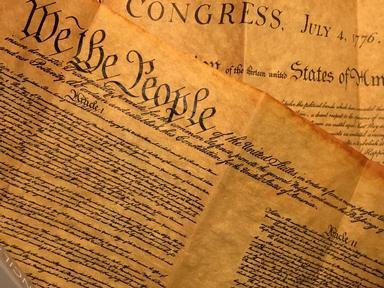Quiz Answer Key and Fun Facts
1. Government is instituted to secure a person's inalienable rights.
2. No tax is allowed in order to vote.
3. A State of the Union address shall be given by the president.
4. A state convention can be called for the purpose of adding amendments.
5. Washington D.C. is allowed electors.
6. The process to add new states to the country.
7. Powers that belong to the state government or the people.
8. The Constitution is the supreme law of the land.
9. Electors vote for a vice president as well as a president.
10. Senators are to be selected by the state legislature.
Source: Author
Buddy1
This quiz was reviewed by FunTrivia editor
trident before going online.
Any errors found in FunTrivia content are routinely corrected through our feedback system.

